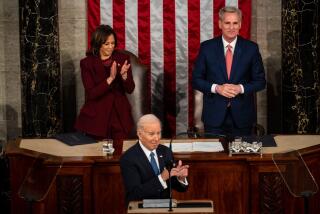White House Doesn’t Share Outsiders’ Concerns Over Deficit
WASHINGTON — White House officials on Tuesday called this year’s projected $455-billion federal budget deficit manageable and fleeting, brushing aside charges that the record amount of red ink was an indictment of President Bush’s economic and fiscal policies.
Joshua Bolten, director of the White House Office of Management and Budget, also predicted that the sweeping tax cuts enacted since Bush took office would help spur an economic recovery that would halve the deficit by 2006.
Still, the new deficit projection -- more than 50% higher than the OMB estimated in February -- may complicate prospects for a Medicare prescription drug benefit or an expansion of tax relief for low-income families.
It is the latest in a series of worsening forecasts that have led Bush and his fellow Republicans to shelve past campaign promises to keep the budget in balance. The new report poses a fresh test of the GOP’s willingness to put aside conservative orthodoxy and argue that reducing the deficit should take a back seat to other priorities at a time of war and economic slowdown.
There were some signs that Republicans were finding it more difficult to sustain that argument. “It is significantly higher than we anticipated,” Senate Majority Leader Bill Frist (R-Tenn.) said of the deficit. “It is high. It is too high.”
And it is likely to go even higher. The forecast does not include the ongoing costs of U.S. operations in Iraq beyond what already has been appropriated. Even without those costs, the OMB said, the deficit would rise to $475 billion next year.
Yet neither the White House nor Republicans in Congress have proposed any major change in fiscal course to cut the deficit. Rolling back recent tax cuts is a nonstarter. The year’s appropriations bills are expected to continue moving through Congress at previously set levels.
Still, the growing deficit could make the climate less favorable to Bush’s plan to establish a prescription drug benefit under Medicare. “It doesn’t come at a good time,” a senior House GOP aide said of the deficit report. “There is some consternation about how these numbers will play out in Medicare.”
The deficit could aid Republicans who object to the cost of a Medicare prescription benefit. A small but influential group of conservatives turned last month’s House vote on its Medicare bill from a party-line certainty into a one-vote cliffhanger. “It’s going to be harder,” said House Budget Committee Chairman Jim Nussle (R-Iowa). “This should give everybody pause with respect to spending.”
Concerns about the deficit also may make it more difficult for House and Senate Republicans to agree on a compromise to expand tax relief for low-income families with children. Deficit-conscious Senate Republicans have been resisting a big, $80-billion version of that bill passed by the House; the new deficit figures could make them even less likely to compromise on their insistence that any new tax cuts be offset with tax increases in other areas.
The deficit also could undercut bipartisan support Congress has given to Bush’s requests for increased security and defense spending. “Is it sustainable to have the continuing increases the president is proposing?” asked Sen. Kent Conrad (D-N.D.) “We’re going to have to go back to basics.”
Democratic presidential candidates seized on the deficit report to criticize Bush economic policies that their party’s lawmakers in Congress have been powerless to stop. Sen. John F. Kerry (D-Mass.) said the new projection was “proof that we don’t just need a new economic team, we need a new president.”
Some Republicans worry that concern about growing deficits could undercut public support for Bush’s stewardship of the economy. “Democrats are trying to frame it in terms of the deficit,” said David Winston, a GOP pollster. “If the economic discussion happens in the context of the deficit, it’s a problem.”
The new estimates easily top the previous record of $290 billion set in 1992. But Bolten argued it is more important to focus on the deficit as a percentage of the gross domestic product to assess its impact on the economy. By that measure, the deficit would be 4.2% of the economy, he said, a level well below the post-World War II peak of 6% of GDP.
More to Read
Get the L.A. Times Politics newsletter
Deeply reported insights into legislation, politics and policy from Sacramento, Washington and beyond. In your inbox three times per week.
You may occasionally receive promotional content from the Los Angeles Times.











